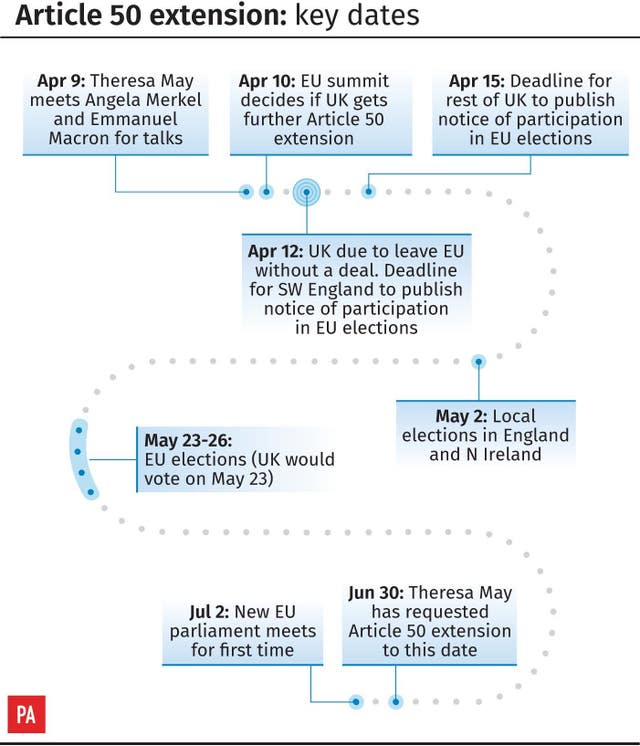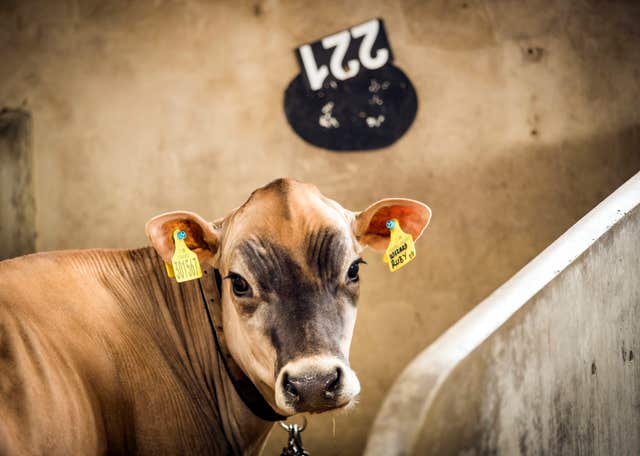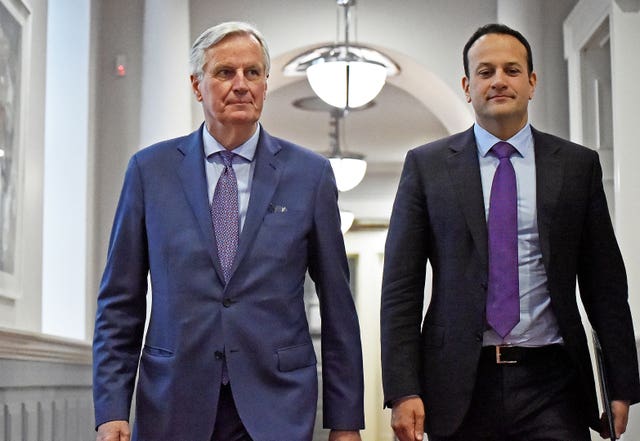At 11pm on Friday, the UK will leave the EU without a deal unless leaders meeting this week in Brussels grant a further extension to the Article 50 withdrawal process.
What is a no-deal Brexit?
A no-deal break means Britain would immediately cease to be an EU member state and the 585-page Withdrawal Agreement would not apply.
READ MORE: Brexit: Here are the key events this week
That would mean the planned transition period to the end of 2020 – intended to allow firms to carry on trading with the EU under the existing rules while they adapt to the new arrangements – would not kick in.
It would also affect citizens’ rights, the Irish border and UK’s £39 billion “divorce” bill.
PM @Theresa_May explains what's happening with Brexit. pic.twitter.com/rHnROzm3SH
— UK Prime Minister (@10DowningStreet) April 7, 2019
So what would that mean for trade?
The legal basis for the free movement of goods between Britain and the EU would disappear, and instead, the UK would move to trading under the World Trade Organisation (WTO) rules. That means a new tariff regime as well as new customs and regulatory checks.
The Government has announced that, as a temporary measure, there would be no tariffs on most goods coming into UK (87% by value compared with 80% at present) although there will be protections for some industries, including meat and dairy producers, car manufacturers and makers of ceramics.
For trade with non-EU countries, the Government has said it wants to carry on with the same arrangements with those countries that have trade deals with the EU.
READ MORE: No-deal Brexit: How would it impact transport
So far it has managed to “roll over” a number of agreements, including those with Switzerland, Norway and Israel, but others, including those with Japan and Turkey, have yet to be agreed.
 (PA Graphics)
(PA Graphics)
How will that work at the border?
Until it actually happens, no-one can be quite sure. The Government has said it will do what it can to ensure that goods continue to flow into the country as smoothly as possible, waiving checks where it can.
However, there are concerns that many firms – particularly smaller traders – are still not properly prepared for dealing with the new procedures. That has raised fears of long tailbacks of lorries at the Channel ports, at least in the short term.
There will be new checks on livestock and food products being exported from the UK into the EU as Britain may no longer be considered compliant with EU regulatory standards.
 There will be new checks on livestock being exported from the UK into the EU (Danny Lawson/PA)
There will be new checks on livestock being exported from the UK into the EU (Danny Lawson/PA)
What will be the effect in the shops?
With around 30% of the UK’s food imported from the EU, supermarkets have warned of higher prices and empty shelves in the event of no-deal.
Bank of England Governor Mark Carney has said there could be a hike of 5% to 10% in food prices, while there are concerns about the impact on the supply of perishable goods if no-deal results in delays at the border.
Tariffs could add around £1,500 to the price of a typical car imported from the EU.
Brexiteers, however, argue that many of the concerns are exaggerated, with the UK importing a wide variety of fresh produce from non-EU countries.
Consultations with PM @AndrejPlenkovic yesterday evening and with Chancellor Merkel this morning on #brexit ahead of #EUCO.
— Donald Tusk (@eucopresident) April 9, 2019
What about medicines?
The NHS imports large quantities of drugs and medical equipment from the EU and there are concerns about the impact of no-deal on costs and on complex supply chains.
The Government – which has been urging pharmaceutical companies to stockpile six weeks worth of essential medicines – has said measures are in place to ensure that patients will continue to get the drugs they need.
Extra shipping capacity has been secured and warehouses with refrigeration facilities rented to store medicines, while arrangements have made to fly in those which cannot be stockpiled.
However, there have been reports that some hospitals are already experiencing shortages of drugs as the date for the UK’s departure approaches.
Si le Royaume-Uni est en mesure d'approuver l'accord de retrait avec une majorité viable d'ici au 12 avril, alors l'Union européenne devrait accepter une prorogation jusqu’au 22 mai.
I will do everything to prevent a disorderly #Brexit.🇪🇺🇬🇧https://t.co/EOGpdIYpPr
— Jean-Claude Juncker (@JunckerEU) April 3, 2019
What about citizens’ rights?
No-deal means that there is no agreement on the rights of EU citizens living in the UK and British nationals in the EU.
The Government has said it will continue to guarantee the rights of the estimated three million EU citizens in the UK, allowing them to gain “settled status”, as would be the case if there was a deal.
However, Parliament’s Human Rights Committee has warned that Government legislation means they could be denied access to benefits such as council housing and social security payments, even if there is a deal.
For the one million UK nationals in the EU, in the event of no-deal, their future status will depend on the individual member states where they are resident. The European Commission has urged them to adopt a generous approach, but it remains unclear how they will respond.
 Michel Barnier (left) and Leo Varakdar both want to prevent a no-deal Brexit (Clodagh Kilcoyne/PA)
Michel Barnier (left) and Leo Varakdar both want to prevent a no-deal Brexit (Clodagh Kilcoyne/PA)
How will the Irish border work?
Both sides have said there will be no return of physical checks on the border between Northern Ireland and the Republic, but have yet to spell out how it will work in practice.
The UK has said that, as a temporary measure, it will not impose any new checks or require customs declarations on most goods crossing the border into Northern Ireland, while a longer-term solution is found.
Irish premier Leo Varadkar has also stated his commitment to an open border.
At the same time, he has assured fellow EU leaders that he will not allow Ireland to become a “backdoor” into the EU single market for goods coming via Northern Ireland but has not so far explained how that can be achieved.



Why are you making commenting on The Herald only available to subscribers?
It should have been a safe space for informed debate, somewhere for readers to discuss issues around the biggest stories of the day, but all too often the below the line comments on most websites have become bogged down by off-topic discussions and abuse.
heraldscotland.com is tackling this problem by allowing only subscribers to comment.
We are doing this to improve the experience for our loyal readers and we believe it will reduce the ability of trolls and troublemakers, who occasionally find their way onto our site, to abuse our journalists and readers. We also hope it will help the comments section fulfil its promise as a part of Scotland's conversation with itself.
We are lucky at The Herald. We are read by an informed, educated readership who can add their knowledge and insights to our stories.
That is invaluable.
We are making the subscriber-only change to support our valued readers, who tell us they don't want the site cluttered up with irrelevant comments, untruths and abuse.
In the past, the journalist’s job was to collect and distribute information to the audience. Technology means that readers can shape a discussion. We look forward to hearing from you on heraldscotland.com
Comments & Moderation
Readers’ comments: You are personally liable for the content of any comments you upload to this website, so please act responsibly. We do not pre-moderate or monitor readers’ comments appearing on our websites, but we do post-moderate in response to complaints we receive or otherwise when a potential problem comes to our attention. You can make a complaint by using the ‘report this post’ link . We may then apply our discretion under the user terms to amend or delete comments.
Post moderation is undertaken full-time 9am-6pm on weekdays, and on a part-time basis outwith those hours.
Read the rules hereLast Updated:
Report this comment Cancel